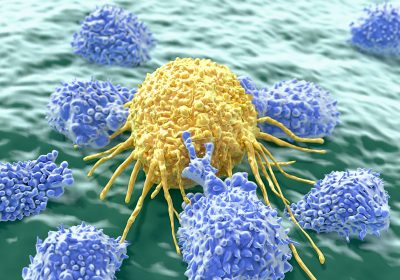AACR Annual Meeting 2019: Cancer Science With a Global Impact
The greatest minds in cancer science gathered March 29-April 3 for the AACR Annual Meeting 2019 in Atlanta. More than 21,000 cancer researchers, physician-scientists, advocates, and others from around the world came together to learn about the latest breakthroughs in clinical research, prevention and early detection, basic cancer science, and translational research. The meeting’s theme was “Integrative Cancer Science • Global Impact • Individualized Patient Care.”
Clinical Research
A record 213 clinical trials were presented at the Annual Meeting and covered a wide range of cancer treatments: surgery, radiotherapy, chemotherapy, and the two newest treatment pillars, molecularly targeted therapy and immunotherapy.
- Data from the phase III ADMIRAL clinical trial showed that treatment with the targeted treatment gilteritinib (Xospata) improved survival for a segment of patients with relapsed or refractory acute myeloid leukemia (AML), compared to those treated with standard chemotherapy. Gilteritinib targets relapsed or refractory AML that tests positive for a mutation in the FLT3 gene.
- Data from the phase III MYSTIC trial demonstrated the utility of tumor mutational burden as a biomarker for treatment with immune checkpoint inhibitors. The study found that a larger number of tumor mutations is a reliable indicator that an immune checkpoint inhibitor will be effective.
- Results from the phase II DART trial showed that a combination of the anti-CTLA-4 immunotherapeutic ipilimumab (Yervoy) and the anti-PD-1 immunotherapeutic nivolumab (Opdivo) benefited patients with rare, high-grade neuroendocrine carcinoma.
Findings in Prevention, and Preclinical and Translational Research
Results from several important studies were reported at the meeting.
- The latest data were presented from the Cancer Prevention Study (CPS)-II Nutrition Cohort. More than 120,000 men and post-menopausal women without cancer were studied to determine the effect of physical activity on cancer risk associated with excess body fat (EBF). The data showed that an active lifestyle benefited study participants, even those with high body mass index, by lowering their risk for EBF-associated cancers.
- A vaccine developed using four tumor antigens—molecules found on cancer cells that generate an immune response—produced antigen-specific responses, reduced intestinal tumors, and improved survival in a mouse study of Lynch syndrome. The findings suggest it may be possible to develop a cancer preventive vaccine for patients with Lynch syndrome. People with this condition have about an 80 percent lifetime risk for colorectal cancer and an increased risk for other cancer types, including small intestine, stomach, endometrial, bladder, and ovarian.
- Several studies identified potential new molecular targets for developing breast cancer treatments, including BCL-2, FGFR, HDAC, and IGF-1/2.
- Data from a nutrition intervention clinical trial showed that replacing dietary animal protein with plant-based protein decreased the levels of intestinal N-nitroso compounds. These compounds play an important role in the development of colon cancer.
NCI Leaders Speak
Two of the nation’s most prominent leaders in cancer research and policy—Norman “Ned” Sharpless, MD, and Douglas R. Lowy, MD—took the stage March 31 during the Annual Meeting Opening Ceremony. At the time they spoke, Dr. Sharpless was the director of the National Cancer Institute (NCI), and Dr. Lowy was deputy director. Currently, Dr. Sharpless is the acting commissioner of the Food and Drug Administration (FDA), and Dr. Lowy is the acting director of the NCI.
Dr. Sharpless praised the scientific advances that have led to lower cancer mortality rates since the 1990s. He said that progress in early detection, screening, therapy, and prevention will lead to strong declines in cancer mortality for years to come.
Dr. Lowy said the number of grant applications to the NCI has grown by about 50 percent since 2013, but the increased demand is unlikely to be met by an NCI budget that has grown
more modestly.
“The truism that we always run out of funds before we run out of promising research ideas is even more valid today than in the past,” he said.
Policy Issues in the Forefront
The Annual Meeting featured two policy tracks, “Regulatory Science and Policy” and “Science and Health Policy.” A highlight was a session titled “PD-1 Pandemonium: FDA Speaks With Industry on the Past, Present, and Future of PD-1 Drugs.” In the session, Richard Pazdur, MD, director of the FDA’s Oncology Center of Excellence, gathered with representatives from six biopharmaceutical companies to discuss the past, present, and future of PD-1/PD-L1 drugs. These drugs are part of a class of cancer treatments called immune checkpoint inhibitors that remove the brakes on immune system T cells so they can destroy cancer cells. Immune checkpoint inhibitors accounted for 21 percent of the FDA’s oncology drug approvals in 2018, Dr. Pazdur noted, and in the past five years, they have yielded remarkable and durable responses for patients with a variety of cancers.
A Focus on Patients and Survivors
Progress against cancer has led to a growing number of cancer survivors, currently numbering about 16.9 million in the United States. In the Presidential Select Symposium titled “Engaging Cancer Patients as Partners in the Research Process,” held March 31 and chaired by outgoing AACR president Elizabeth M. Jaffee, MD, participants examined the changing role of patients in cancer research.
“We are witnessing a culture shift in how patients participate in cancer research,” said Dr. Jaffee, who is the deputy director of the Sidney Kimmel Comprehensive Cancer Center at Johns Hopkins in Baltimore. “This process is driven by patients, survivors, and their families, and it’s becoming an integral part of cancer research.”
Vernal Branch, who survived breast cancer 25 years ago and has been an active patient advocate since then, urged researchers to keep patients involved through all stages of their care, even inviting them into their labs when appropriate.
“If they’re smart enough to understand their own health care,” she said of patients, “they’re smart enough to know what you’re doing in the lab.”
In a separate session focused on survivorship held March 31, Anna D. Barker, PhD, who chaired the session, identified numerous challenges facing cancer survivors, including cancer progression and recurrences or entirely new cancers, as well as a negative impact on quality of life. Dr. Barker is director of the National Biomarker Development Alliance, director of Transformative Healthcare Knowledge Networks, co-director of Complex Adaptive Systems, and professor in the School of Life Sciences at Arizona State University in Tempe.
One of the results of having larger numbers of patients living longer, Dr. Barker said, is that more cancer survivors will be living into their 80s or 90s.
“I don’t think we’re prepared for it in the health system or for the economics that this will entail,” Dr. Barker said of a large, aging survivor population.
Getting the Word Out
The Annual Meeting garnered national and international media coverage. Key media outlets included the Associated Press, CNN, NBCNews.com, Time, CBS Evening News, Forbes, STAT, Nature, and Science. The meeting was covered internationally by media outlets from Brazil, Canada, France, Germany, Italy, Russia, Egypt, India, China, Japan, and South Korea.
On March 30, the AACR hosted a community event called “Progress and Promise Against Cancer,” in partnership with Morehouse School of Medicine in Atlanta to educate the community about cancer clinical trials and cancer risk reduction. Speakers emphasized cancer health disparities—differences in health outcomes due to race, income level, education, the area where one lives, and other factors. The event was hosted by Elaine R. Mardis, PhD, who became AACR president during the Annual Meeting. Dr. Mardis is co-executive director of the Institute for Genomic Medicine at Nationwide Children’s Hospital in Columbus, Ohio.
In the closing plenary session, titled “AACR Annual Meeting 2019 Highlights: Vision for the Future,” on April 3, Dr. Jaffee; John D. Carpten, PhD, chair of the Annual Meeting 2019 Program Committee; and Marcia R. Cruz-Correa MD, PhD, and Patricia M. LoRusso, DO, vice chairs, provided an Annual Meeting overview on the topics of prevention, early detection, interception, and breakthroughs in cutting-edge basic, translational, and clinical research, and discussed future directions for these disciplines. Dr. Carpten is director of the Institute of Translational Genomics at the Keck School of Medicine of USC in Los Angeles. Dr. Cruz-Correa is professor of medicine and biochemistry at the Comprehensive Cancer Center of the University of Puerto Rico in San Juan. Dr. LoRusso is associate director of Experimental Therapeutics at Yale Cancer Center in New Haven, Connecticut.
Dr. Mardis concluded the session by saying, “I’m so excited to be here and to be your president for the upcoming year. I’m looking forward to all the roles that I will play in support of this wonderful organization.”





